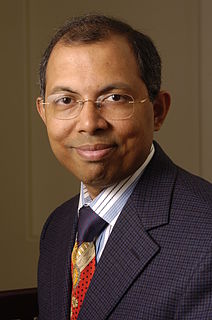Цитата Бертрана Рассела
Если вы думаете, что ваша вера основана на разуме, вы поддержите ее аргументами, а не преследованием, и откажетесь от нее, если аргумент пойдет против вас. Но если ваша вера основана на вере, вы поймете, что аргумент бесполезен, и поэтому прибегнете к силе либо в форме преследования, либо путем замедления роста или искажения умов молодежи в том, что называется «образованием».
Связанные цитаты
Если у нас с вами нет диалога, когда вы ссоритесь, причина ссоры в том, что мы не слушаем друг друга. Затем возникает спор, но если мы действительно слушаем, а не слушаем, спора не будет. Затем мы будем сочувствовать, а затем, как только сочувствие включится, вы будете гораздо больше склоняться к моей точке зрения, а я буду склоняться к вашей точке зрения, а это то, чего не хватает в организациях.
В конечном счете, нынешний аргумент заключается в том, что «отсутствие сетевого нейтралитета повредит инновациям», и вы можете привести этот аргумент, но я бы предпочел привести аргумент общественного блага, который касается не только инноваций или развития новых компаний, которые будут увеличивать ВВП страны. , речь идет о создании демократической общественной сферы.
Обычно говорят, что если рациональные доводы так редко являются причиной убеждения, то апологеты философии, должно быть, впустую тратят свои усилия. Посылка верна, но вывод не следует. Хотя аргумент не создает убеждения, его отсутствие разрушает веру. То, что кажется доказанным, может не приниматься; но то, что никто не проявляет способности защищать, быстро бросается. Рациональный аргумент не создает веру, но поддерживает атмосферу, в которой вера может процветать.
Аргумент в пользу свободы — это не аргумент против организации, которая является одним из самых мощных инструментов, которые может использовать человеческий разум, а аргумент против всякой исключительной, привилегированной, монополистической организации, против использования принуждения, чтобы помешать другим работать лучше.
... [священное] учение особенно основано на аргументах авторитета, поскольку его принципы получены через откровение: таким образом, мы должны верить на основании авторитета тех, кому было дано откровение. Это также не умаляет достоинства этой доктрины, поскольку, хотя аргументы, основанные на человеческом разуме, являются самыми слабыми, аргументы, основанные на божественном откровении, являются самыми сильными.
Я думаю, что Мартин Лютер правильно различал то, что он называл авторитетным и министерским использованием разума. Арбитражное использование разума происходит, когда разум стоит над евангелием, как судья, и судит о нем на основе аргументов и доказательств. Служебное использование разума происходит, когда разум подчиняется Евангелию и служит ему… Если возникает конфликт между свидетельством Святого Духа об основных истинах христианской веры и верованиями, основанными на аргументах и доказательствах, то первое должно иметь приоритет над вторым.
Предполагаемая инстинктивная вера в Бога использовалась многими людьми в качестве аргумента в пользу его существования. Но это опрометчивый аргумент, так как таким образом мы были бы вынуждены поверить в существование многих жестоких и злобных духов, лишь немногим более могущественных, чем человек; ибо вера в них гораздо более распространена, чем в благодетельное божество.
Есть два вида всеобъемлющих доктрин: религиозные и светские. Те, кто придерживается религиозной веры, скажут, что я даю завуалированный аргумент в пользу секуляризма, а последние скажут, что я даю завуалированный аргумент в пользу религии. Я отрицаю оба. Каждая сторона исходит из основных идей конституционной демократии, поэтому я предлагаю, чтобы наши политические аргументы основывались на общественном разуме. Тогда мы стоим на общих основаниях. Вот как мы можем понять друг друга и сотрудничать.
Терминология философского искусства принудительна: аргументы сильны и лучше всего, когда они сокрушительны, аргументы заставляют вас прийти к заключению, если вы верите в посылки, вы должны или должны верить заключению, некоторые аргументы не несут особой силы и т. д. . Философский спор — это попытка заставить кого-то поверить во что-то, хочет он в это верить или нет. Удачный философский аргумент, сильный аргумент заставляет кого-то поверить.


































